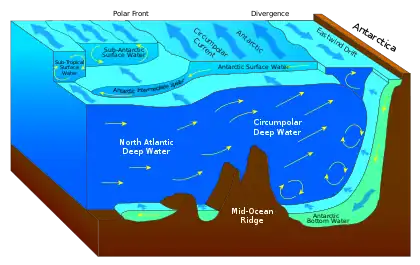.jpg.webp)
Head of tide, tidal limit[2] or tidehead[3] is the farthest point upstream where a river is affected by tidal fluctuations,[4] or where the fluctuations are less than a certain amount.[5] The river section influenced by tides and marine forces but without salinity is a tidal river, while downstream areas are brackish and termed estuaries.[6]
Though this point may vary due to storms, spring tides, and seasonal or annual differences in water flows, there is generally an average point that is accepted as the head of tide (in Great Britain this is the Normal Tidal Limit, typically noted on Ordnance Survey maps as 'NTL').[1] The head of tide is important in surveying, navigation, and fisheries management, and thus many jurisdictions establish a legal head of tide. As the head of tide is useful for navigation, separate maps can be made of the tidal zones up to the head of tide, such as was done in New Jersey.[7]
The head of tide may be many miles upstream from the river's mouth. For example, on the Hudson River, it is located 140 miles (225 km) upstream, near Albany, New York.[8] On the Saint Lawrence River, tides affect the river up to Lake St. Pierre.[9]
See also
References
- 1 2 121 Lincoln & Newark-on-Trent (Map). 1 : 50,000. OS Landranger Map Series. Ordnance Survey. 2004. ISBN 9780319227213.
- ↑ "tidal limit". Australian Water Information Dictionary. Commonwealth of Australia Bureau of Meteorology. 2015. Retrieved 22 February 2015.
- ↑ "Tidehead.". Merriam-Webster.com Dictionary. Merriam-Webster. Retrieved 19 September 2020.
- ↑ Richard A. Davis (Jr.); Richard A. Davis, Jr.; Robert W. Dalrymple (20 October 2011). Principles of Tidal Sedimentology. Springer Science & Business Media. p. 82. ISBN 978-94-007-0123-6.
- ↑ William H. Conner; Thomas W. Doyle; Ken W. Krauss (24 June 2007). Ecology of Tidal Freshwater Forested Wetlands of the Southeastern United States. Springer Science & Business Media. p. 36. ISBN 978-1-4020-5095-4.
- ↑ Hoitink, A. J. F.; Jay, D. A. (2016). "Tidal river dynamics: Implications for deltas". Reviews of Geophysics. 54 (1): 240–272. Bibcode:2016RvGeo..54..240H. doi:10.1002/2015RG000507. S2CID 130986687.
- ↑ New Jersey Archived 2013-02-13 at the Wayback Machine
- ↑ "Tides in the Hudson River" (PDF).
- ↑ "The St. Lawrence".

